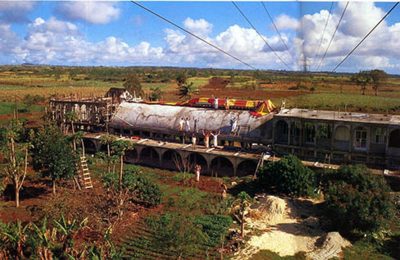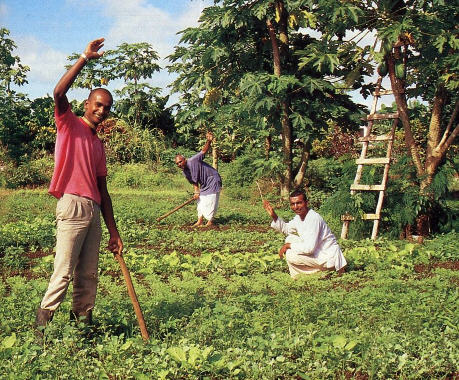On a small island in the Indian Ocean, these devotees are living as Krsna did, and with Krsna on their minds.
As our plane circles over the sea preparing to land. my eye catches the glimmering isle of Mauritius, resplendent against the deep-blue water of the Indian Ocean. I think how appropriately sailors of yore called this tropical paradise "the star of the Indian Ocean." Mark Twain, upon visiting Mauritius for the first time, said, "First God saw Mauritius, then He created heaven." Charles Darwin came here, too, looking for answers to the secrets of life. His Divine Grace A.C. Bhaktivedanta Swami Prabhupada came here in September of 1975 to give the people of this tiny island the answers to those very questions.

Sri Sri Radha-Gokulananda Temple
As our 747 jumbo jet lumbers onto the airfield. I see my Godbrothers and Godsisters atop the visitors' gallery in the airport terminal awaiting my arrival. As we taxi closer. I notice my old friend Sriniketana dasa, who came to Mauritius with a few devotees just before Srila Prabhupada's visit.
I go to the line for customs and immigration, but a young customs officer approaches me and says politely, "Please step this way to the VIP hall." Within minutes I've cleared all formalities and am riding in a car to the temple with Sriniketana dasa.
"What was that VIP treatment all about?" I ask.
"It's only natural." Sriniketana replies, smiling. "Our movement is well known and popular here."
As we drive along. I'm immediately struck by the endless fields of sugarcane. I ask Sriniketana if we also grow sugarcane at our ISKCON farm on the island.
"No," he says, laughing. "When Srila Prabhupada visited here he encouraged us to live simply, set a good example, and become self-sufficient. When people came to visit Srila Prabhupada, he told them. 'I see that on this island of Mauritius you have enough land to produce all your own food grains. But I understand that instead of growing food grains, you are growing sugarcane for export. Why? You are dependent on food grains, like rice, wheat, and dal, so why make an attempt to accumulate money instead of growing sufficient food? First grow your own eatables. Then if there is time and your population has sufficient food grains, you can try to grow other things for export. The first necessity is that you should be self-sufficient. That is God's arrangement.' "
After a scenic one-hour drive, we turn onto Hare Krishna Road and drive past a sign that reads "ISKCON Vedic Farm."
"These five acres were donated to our Society in 1980 by our life member and friend Mr. Gowtam Teelock in the name of his father, Mr. Ramesvar Teelock," Sriniketana says. As my eye catches the construction of what is soon to become a magnificent temple, he smiles and says, "But in the beginning, there was only a stone building with a few iron sheets on top."
I soon realize that our ISKCON farm is in fact the heaven Mark Twain must have been aspiring for. Over the years, the devotees, acting on Srila Prabhupada's instructions, have planted numerous fruit trees, vegetables, spices, and grains. The orchard is full of tropical fruits: mangoes, litchis, mandarins, oranges, grapefruit, papayas, passion fruit, jackfruit, guavas, and custard apples. Banana trees are in abundance.
"The soil is so rich here," says Sriniketana, "that if you throw a mango seed on the ground, a few years later you'll have a mango tree."
"Over here we have many coconut trees," he continues, pointing to a large coconut grove. "They provide many of our necessities. No part of the tree is wasted. When the coconut is green, we drink the water inside and eat the pulp. It's very healthful. We dry the fiber of the shell and use it for polishing our floors and making brushes. We use the leaves for brooms, and when the tree is old, we use the trunk for firewood."
We get out of the car and walk past the gosala, the area where the cows are kept Sriniketana remarks, "We just got word today that we received first prize from the minister of agriculture for our cow-keeping. Our cows are the healthiest and happiest on the island. They sense they won't be killed. Cow protection is vital to the material and spiritual welfare of society. Our cows give milk, and our oxen pull the plows in the fields. Life here is much like it was when Krsna was present in Vrndavana thousands of years ago. We take care of the cows, chant Hare Krsna, and worship our Deities, Sri Sri Radha-Gokulananda."
I remark how much service the devotees are doing here.
"Yes, that's true," Sriniketana says, "They work hard, but because life's simple here, there's enough time to hear and chant about Krsna."

Sriniketana continues, "This bio-gas unit supplies all the natural methane gas we use in cooking for the entire community. We take the dung of our cows, and by mixing it with water in a special process in the unit, gas is generated. We use the residue from that process for fertilizer."
Walking by the temple, he says, "Of the seventy devotees living on the island, thirty-five live here on the farm, and most of them work on the construction of the temple. The temple was designed by our devotee architect, Arjuna dasa, who comes from a prominent Franco-Mauritian family. We hope to finish the temple within two years."
After settling in, we visit Arjuna's thatched-roof house for lunch. Arjuna built the small house for his young family and used the leaves from sugarcane fields to thatch the roof.
"We follow Srila Prabhupada's motto here," says Arjuna, " 'Simple living and high thinking.' Modem civilization is killing people's spirit and good qualities by encouraging them to pursue materialistic goals. People become entangled in the false pursuit of material enjoyment and forget the real purpose of life, Krsna consciousness. Here we live simply and depend on Krsna, who kindly provides us with all the necessities of life. And we offer Krsna the very best we have. Just like the temple we're building here already it's attracting local villagers and tourists from all over the island."
"As I mentioned earlier." says Sriniketana, "we are well known here. A few years ago we walked to every village on the island with a group of about twenty devotees, chanting Hare Krsna and distributing prasadam [food offered to Krsna]. And even today, we are a familiar sight in the cities and towns, chanting Hare Krsna and distributing our books. We recently acquired another piece of land, on the other side of the island, near our preaching center in Quatre Borne. We want to build a temple there, too."
From the airplane, Mauritius seemed small, a tiny island in the vast ocean. But soon I begin to realize that it could easily contain the spiritual world of Krsna consciousness. I take rest for the night thinking of my preaching tour on the star of the Indian Ocean." where Srila Prabhupada sowed the seeds of simple living, high thinking, and beautiful temples to glorify the Lord.
To know more about Indradyumna Swami, visit www.indradyumnaswami.com
